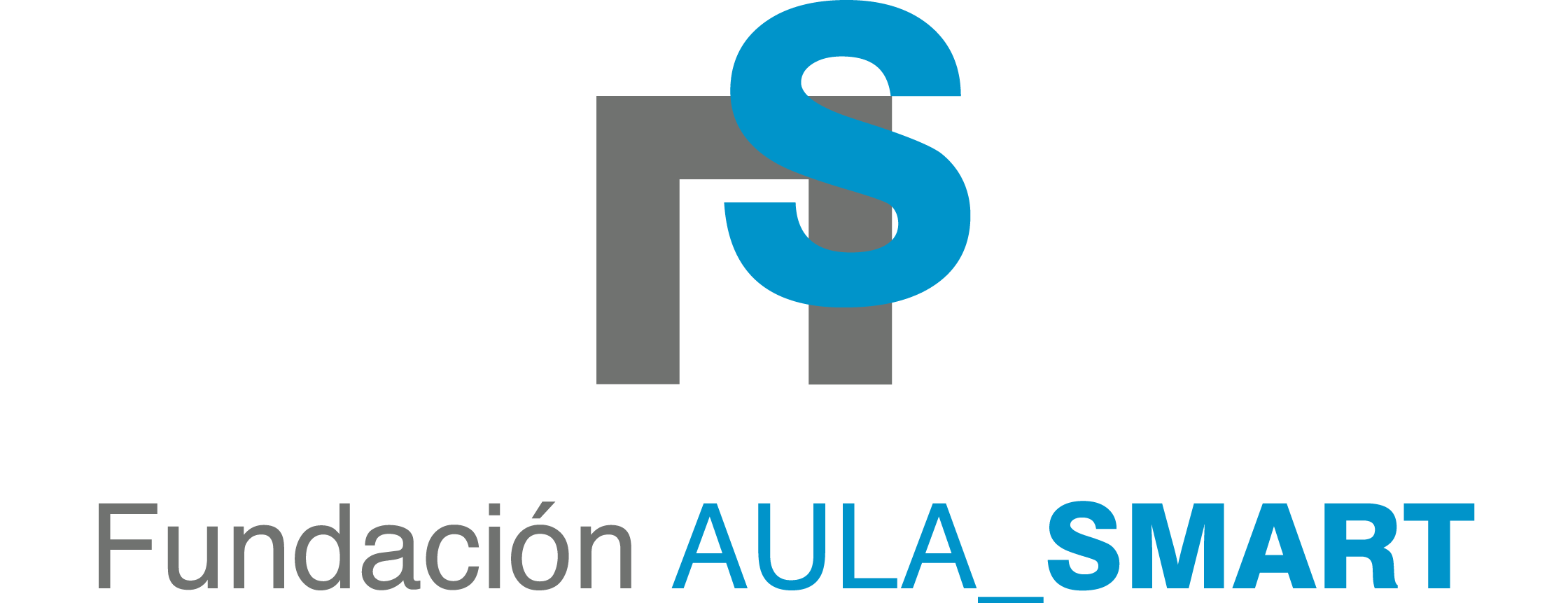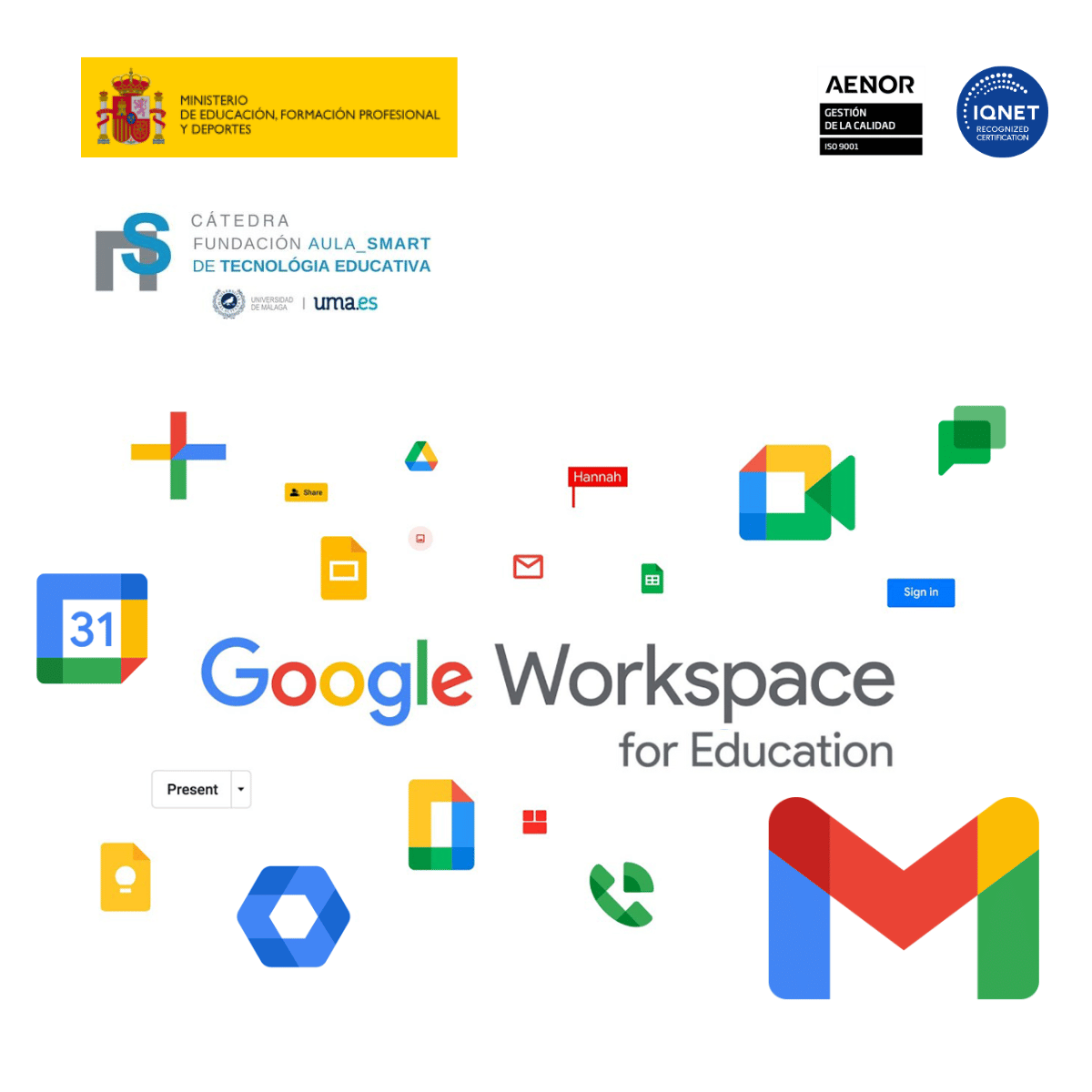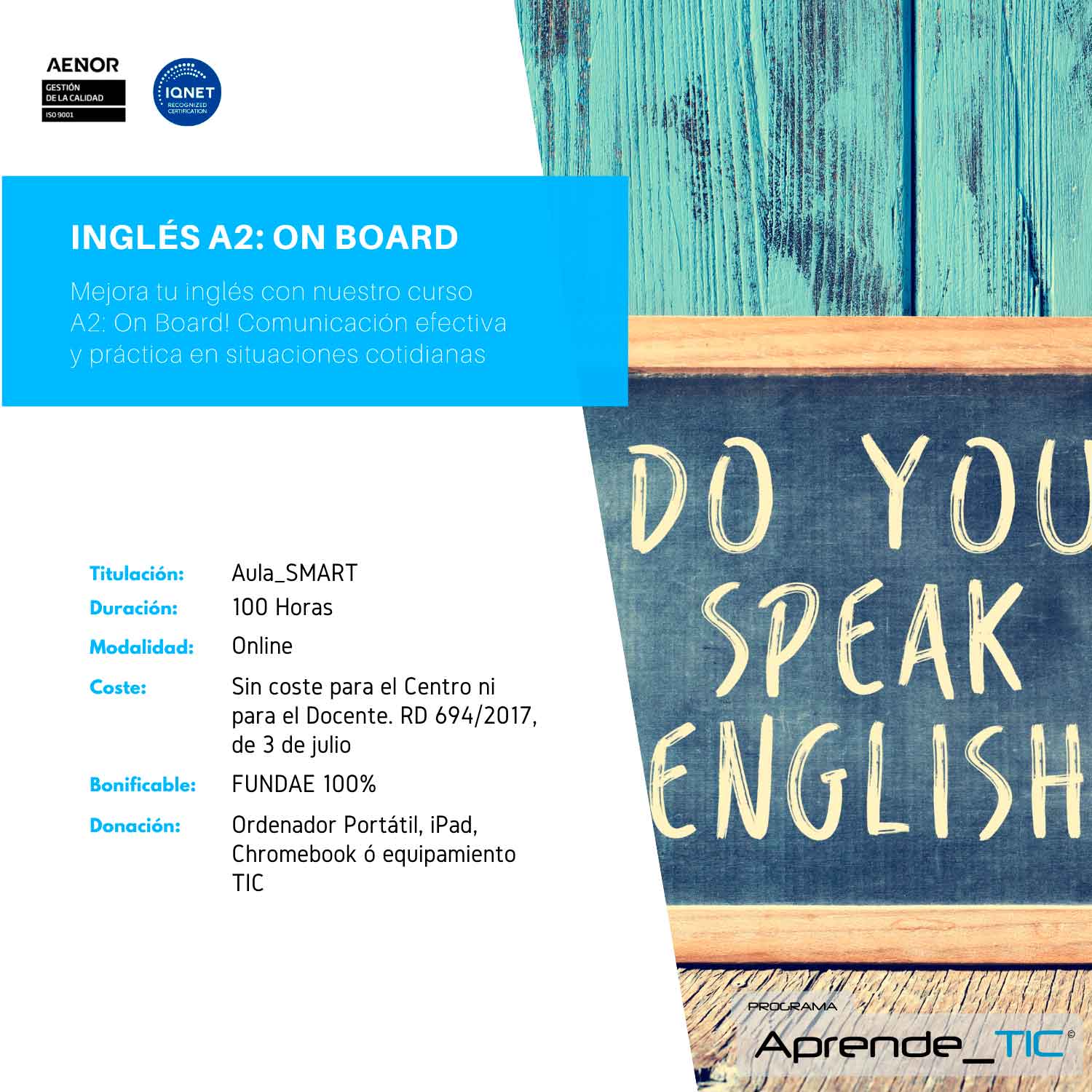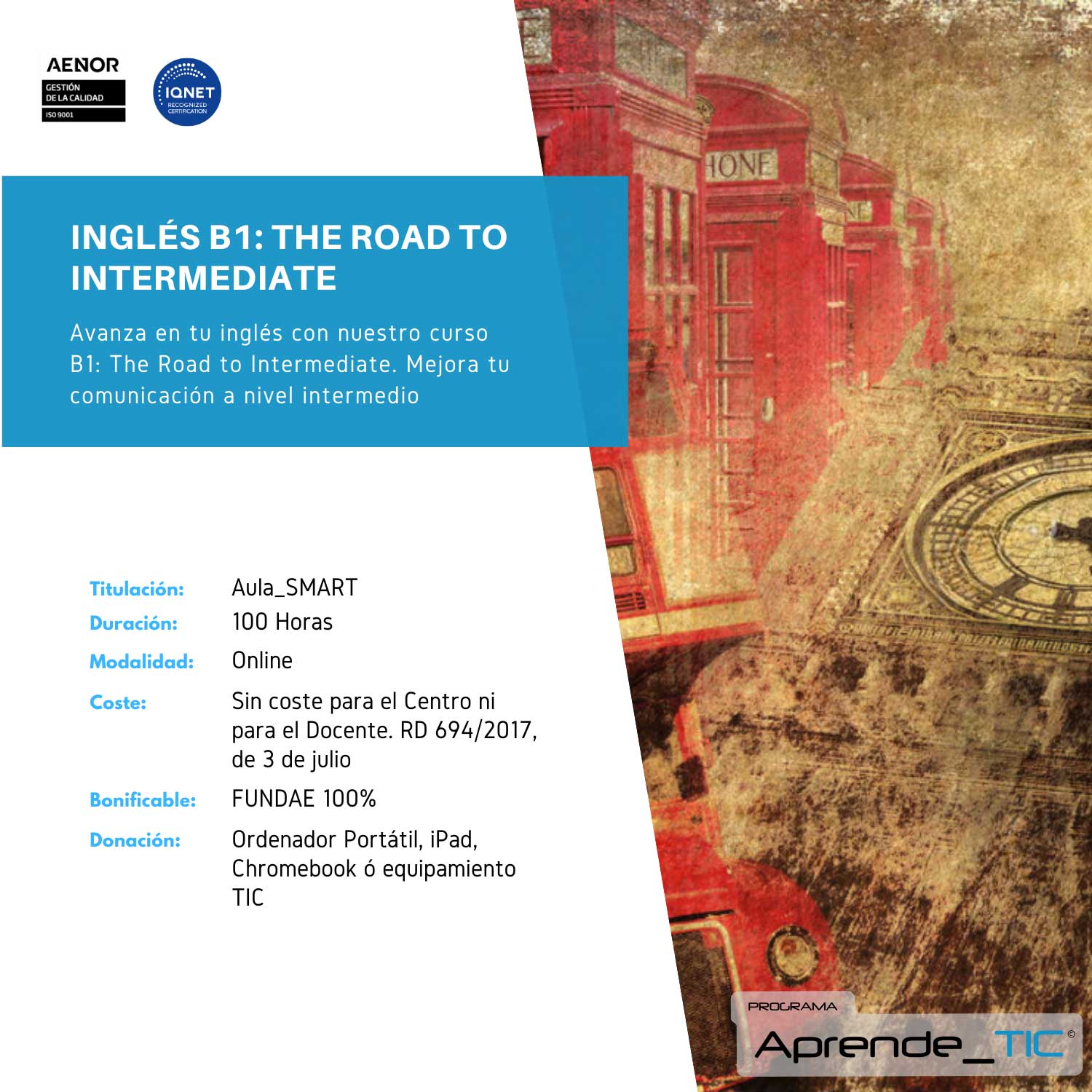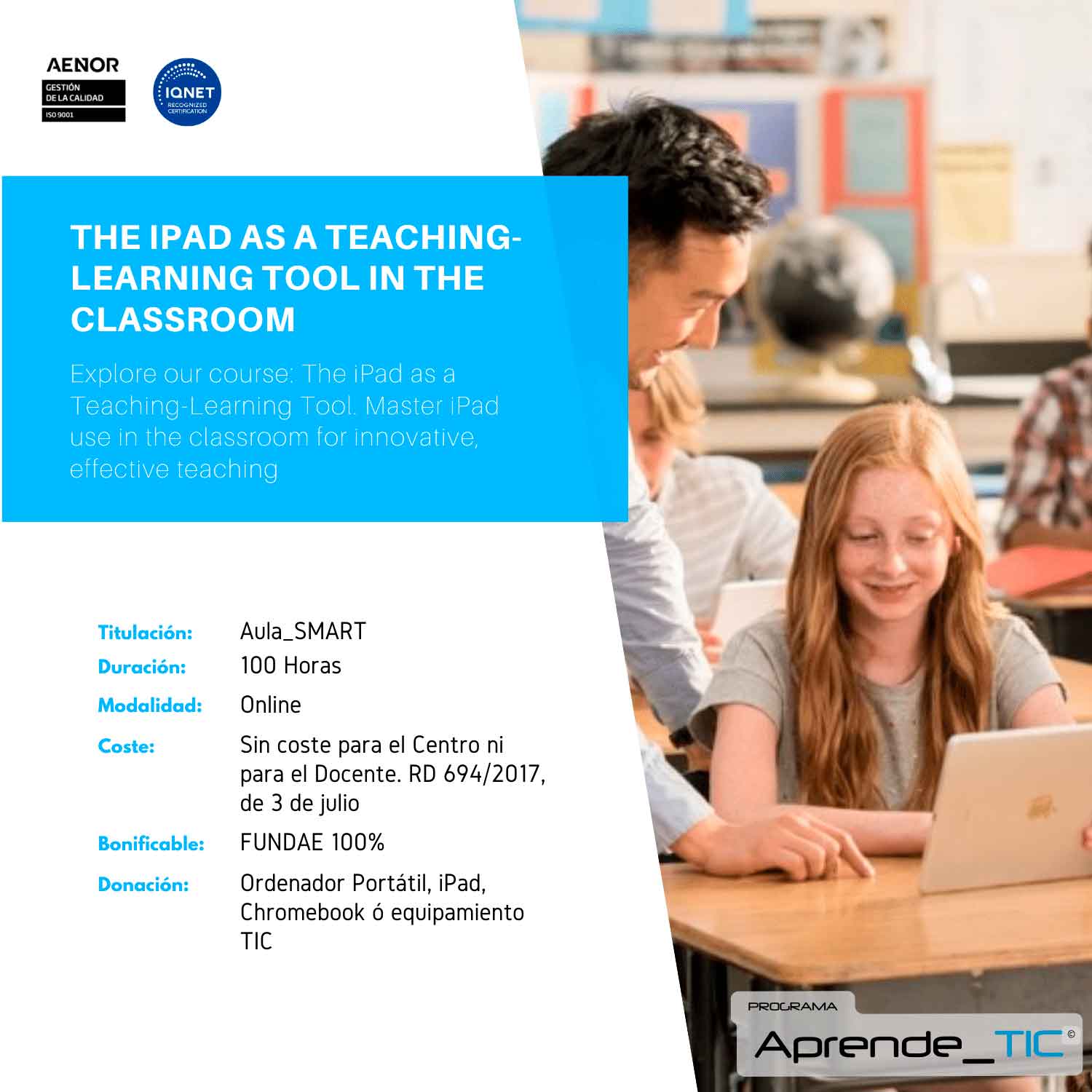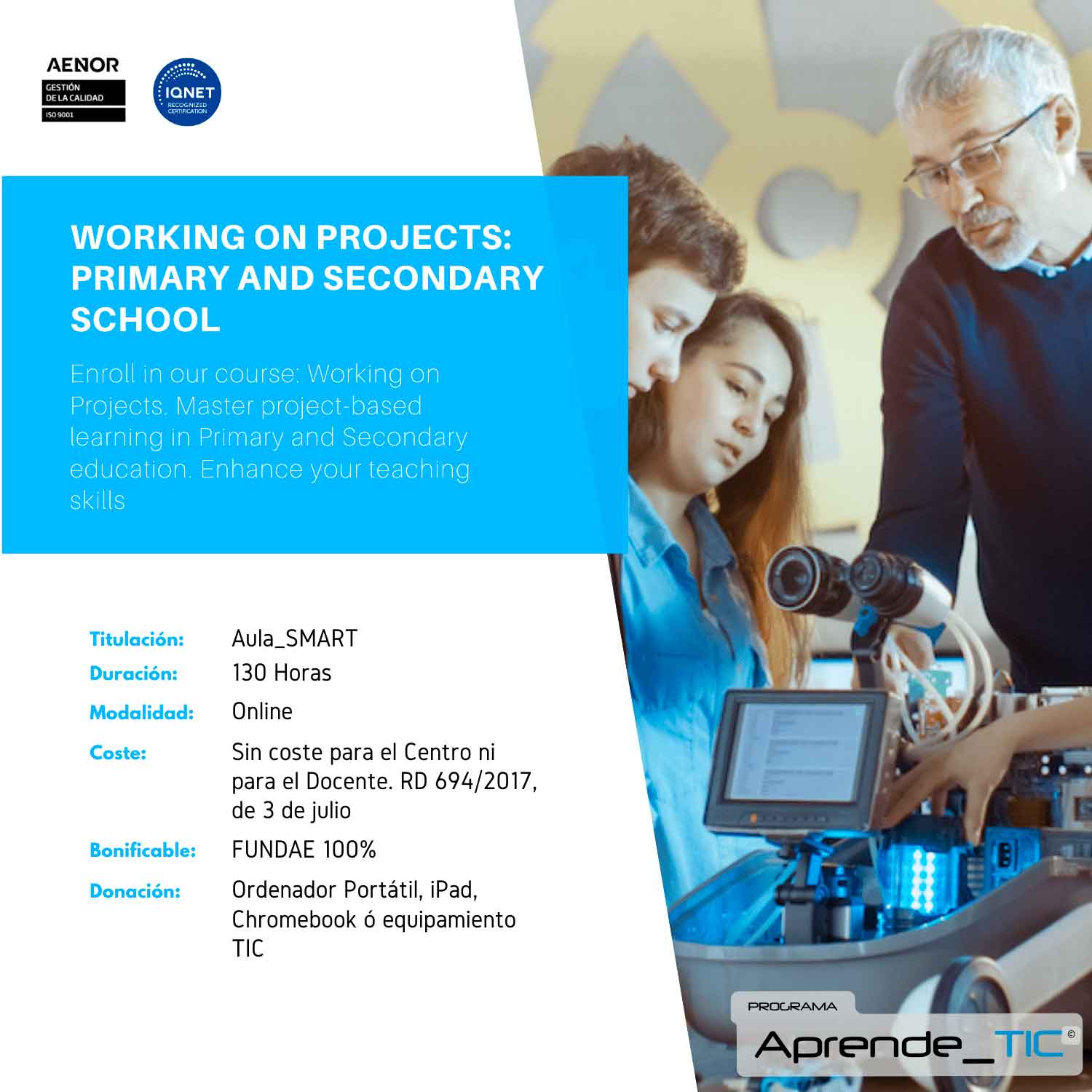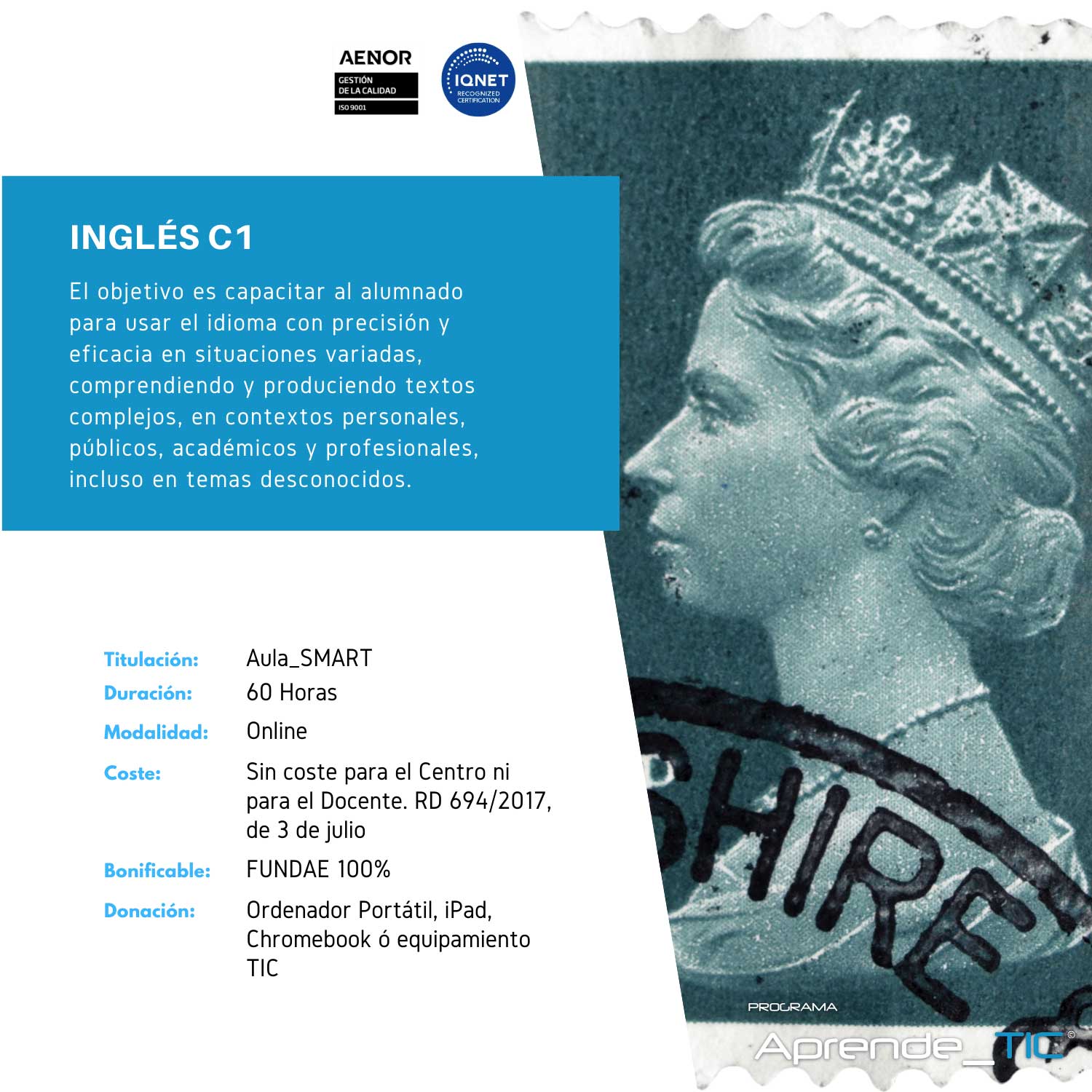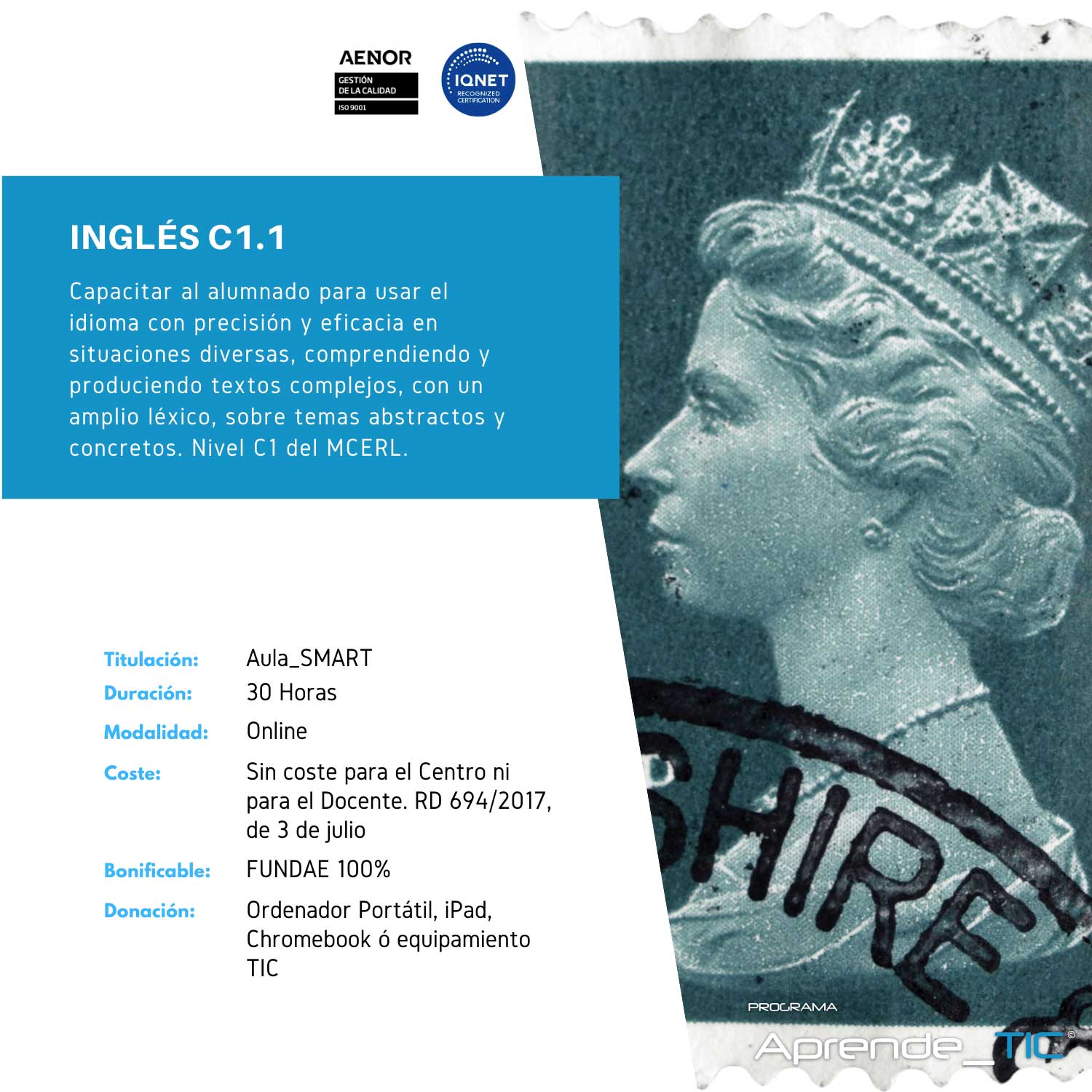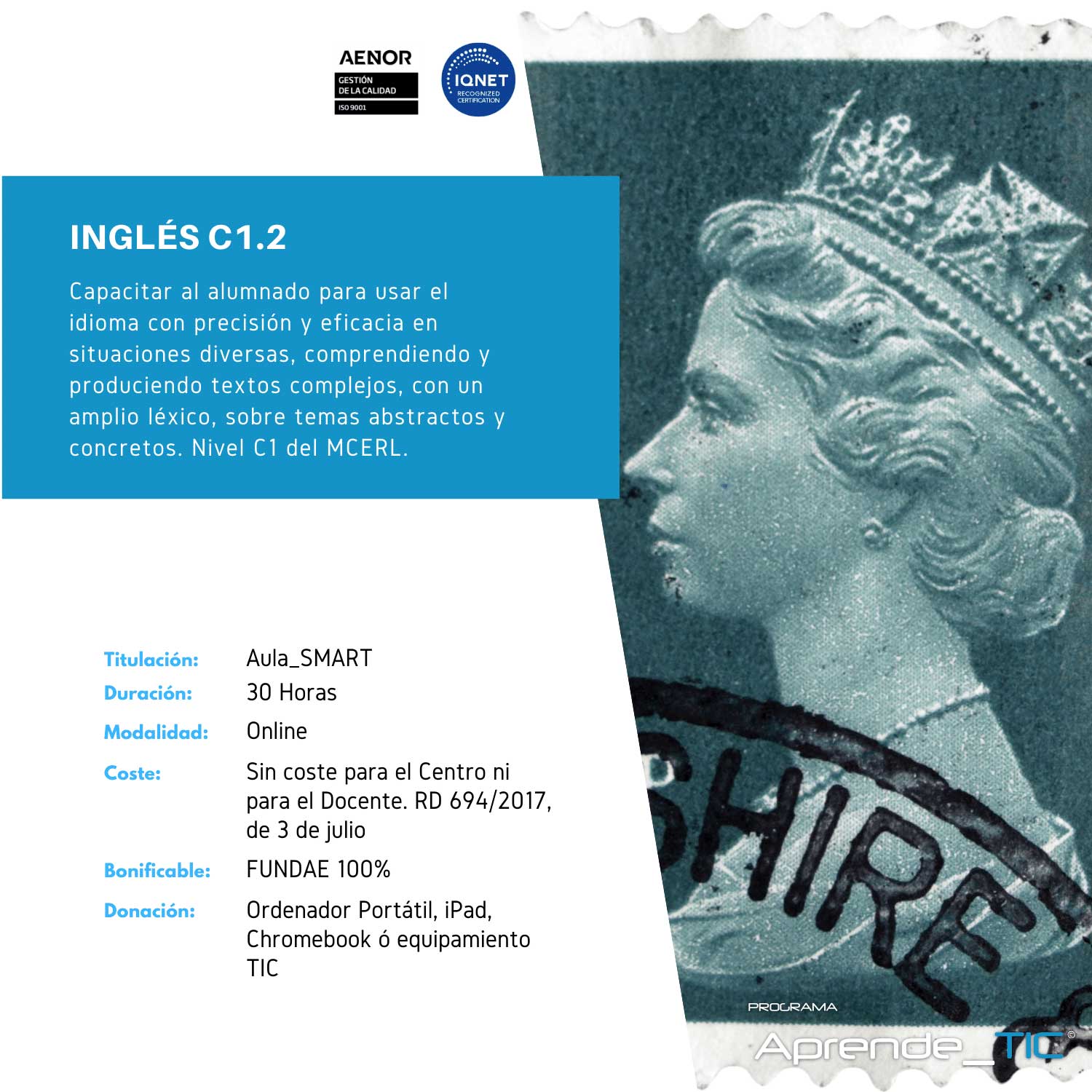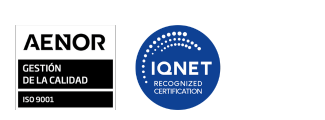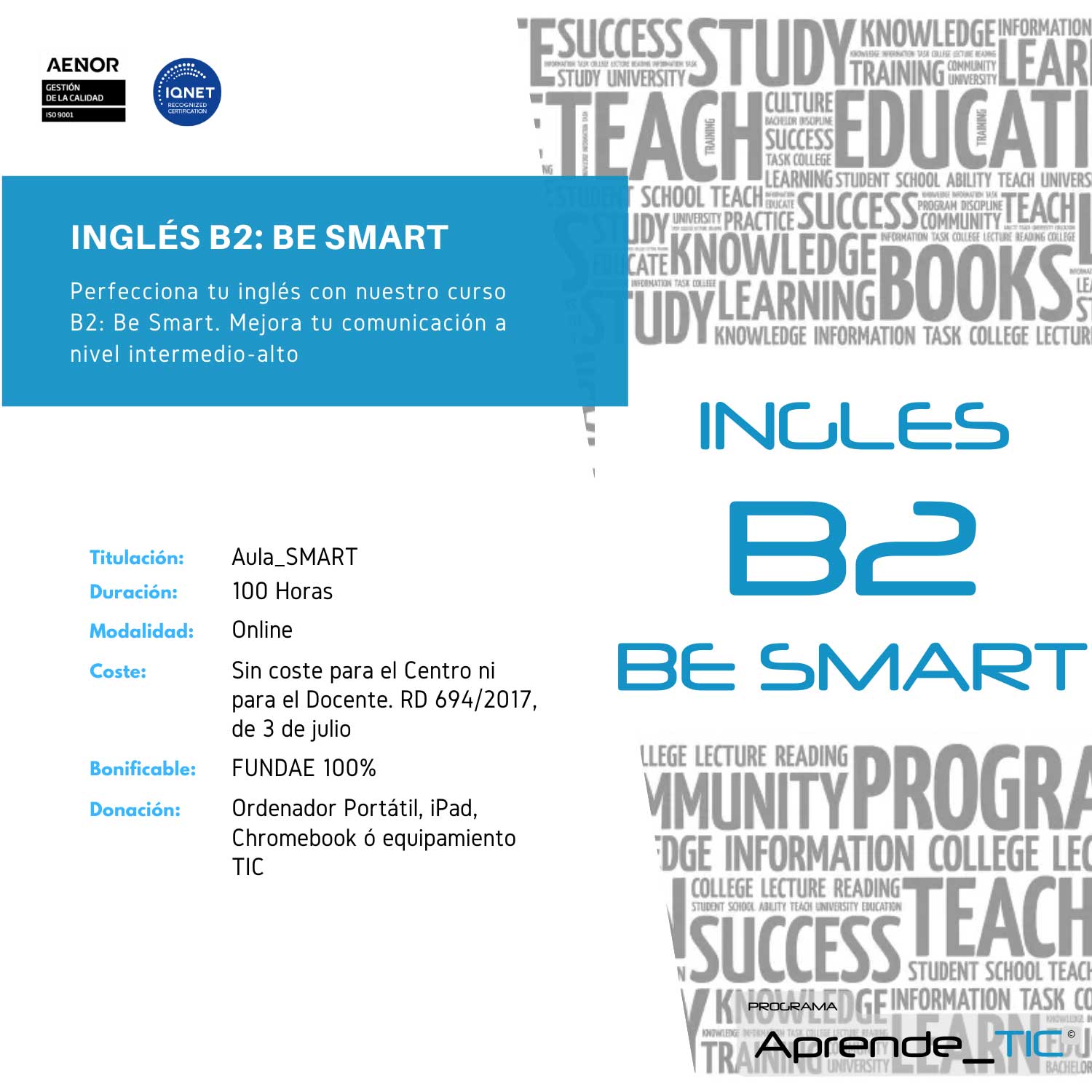
Course
ENGLISH B2: BE SMART
Free registration for the teacher and 100% bonus through Fundae for private and concerted centers, as long as you are in the General Social Security regime, RD 694/2017, of July 3. (Sign up through your center)
Course included in the AUGE_TIC AUGES PROGRAM. Every 100 hours of training, the Aula_Smart Foundation donates a laptop, iPad, Chromebook or other ICT equipment. (Valid for all teachers of private, concerted and public centers)
Date start courses
All communities
- January 22, 2025 to April 2, 2025
- February 12, 2025 to April 28, 2025
- March 5, 2025 to May 19, 2025
- April 2, 2025 to June 6, 2025
- May 7, 2025 to July 15, 2025
- June 4, 2025 to August 7, 2025
- July 2, 2025 to August 7, 2025
Catalonia
- January 22, 2025 to May 12, 2025
- February 12, 2025 to June 2, 2025
- March 5, 2025 to June 20, 2025
- April 2, 2025 to July 11, 2025
Degree: Aula_smart
Duration: 150 hours
Modality: Online
Place: Cabeula_interactive Campus
Cost: No cost to the center or the teacher. RD 694/2017, of July 3
Fundae: 100% bonus
FA_S donation: laptop, iPad, Chromebook or ICT equipment every 100 hours of training
(*) No cost to the center or the teacher according to RD 694/2017, of July 3.
(**) For students who are not going to take the course through their center


ENGLISH B2: BE SMART
Goals
The English B2 course: Be Smart aims to improve your communication skills in English at an intermediate-high level. The specific objectives of the course are:
• Express your opinion and maintain discussions with native speakers about a fairly wide variety of issues with a level of fluidity and spontaneity that makes communication possible effortlessly.
• Understand people who speak English on radio and television, and understand the main points of complex texts.
• Understand and write clear and detailed texts about a wide range of topics, both concrete and abstract, including technical discussions in your specialization field, and express the advantages and disadvantages of different points of view.
• Describe experiences and events, dreams, hopes and ambitions, and briefly give reasons and explanations for opinions and plans.
Oral interaction and production skills
You will be able to:
• Understand spoken language, live or transmitted, on both family and unknown issues.
• Follow extended speeches and complex argument lines.
• Use the language fluently, precision and efficacy in a wide range of general, academic, vocational or leisure issues, clearly marking the relationships between ideas.
• Give your opinion and explain the advantages and disadvantages.
Auditory comprehension skills
You will be able to:
• Understand extended speeches and conferences and even follow complex argument lines provided that the issue is reasonably familiar.
• Understand most news and news programs on television.
• Understand most standard dialect movies.
Reading skills
You will be able to:
• Identify the content and relevance of news, articles and reports on a wide range of topics.
• Quickly scan long and complex texts, locating relevant details.
Writing skills
You will be able to:
• Write clear and well structured texts on complex topics, underlining relevant problems, expanding and supporting views with some extension.
• Write clear and detailed descriptions of real or imaginary events and experiences by marking the relationship between ideas in a clearly connected text.
• Write letters transmitting degrees of emotion and highlighting the personal importance of events and experiences.
This course will provide you with the necessary skills to communicate effectively in English to an intermediate level.

ENGLISH B2: BE SMART
What prepares you
The English B2 course: Be Smart, when focusing on teachers and education professionals, can open various job opportunities:
• English professor at schools: This course can allow you to teach English at your school, or even in other schools that require English teachers with a B2 level.
• Bilingual programs coordinator: Many schools are implementing bilingual programs and need coordinators that are competent in English.
• Pedagogical Advisor: As a pedagogical advisor, you could use your English skills to develop study programs and learning materials in English.
• International school exchanges: You could coordinate school exchange programs with schools from English -speaking countries.
• Teacher training: You could offer English training to other school staff members.
• Teaching subjects in English: Some schools offer subjects given in English. With a B2 level, you could be trained to teach subjects such as science or mathematics in English.
Remember that this course provides you with a solid base, but for some of these professional outings you will need to continue your training and reach a more advanced level of English.

ENGLISH B2: BE SMART
Who is it addressed
The English B2 course: Be Smart is specially designed for:
• Teachers: teachers of all educational levels who wish to improve their English skills to be able to teach in this language or work in an international environment.
• Education professionals: educational support personnel, such as counselors or coordinators, who need English to communicate with colleagues, students or parents who speak English.
• Education professionals interested in international mobility: those who are considering job opportunities or study abroad and need to improve their level of English.
This course is suitable for those who already have a basic knowledge of English and wish to bring their skills to the next level.

ENGLISH B2: BE SMART
Methodology
The course methodology is based on 100%online learning, through the Aula_Smart virtual campus, an innovative and easy -to -use platform, which will allow you to access all the contents and resources of the course from anywhere and device. The course has a highly specialized teaching team, formed by education professionals with extensive experience and training in the analysis of teaching skills. They will accompany you and guide you throughout the learning process, through personalized tutorials, chat, email and even videoconference. The teaching method is totally multidisciplinary, since it combines different pedagogical approaches and strategies, such as:
- Theoretical contents, where the fundamental concepts and principles of the analysis of the teaching skills will be presented, as well as the normative and reference frameworks that regulate them.
- Practical contents, where theoretical knowledge will be applied to real or simulated cases of educational practice, using tools and methodologies to evaluate and develop teaching skills.
- Self -assessment activities, where you will reflect on the teaching performance itself and on the areas of strength and improvement, as well as on the strategies to enhance them.
- Collaborative learning activities, where the exchange of experiences, opinions and proposals through forums will be promoted.
In this way, the course methodology offers you dynamic, participatory and adapted training to your needs and interests, which prepares you to be a competent and effective teacher, capable of adapting to the demands and challenges of current education.
ENGLISH B2: BE SMART
Syllabus
Download the agenda in .pdf format
Topic 1
1.1 Introduction
1.2 Present simple and present continuous. A review.
1.3 Emphatic do.
1.4 IMPERSONAL Sentences with it.
1.5 Word Building: Verb To Nouns. Suffixes
1.6 Infinitive Represented by ITS TO.
1.7 Writing An Argument. Linking Words to Add Information.
1.8 Word Patterns.
1.9 Functions: At The Airport.
Topic 2
2.1 Introduction
2.2 Past simple and continuous, present perfect and continuous: a review.
2.3 Order of Adjectives. Description Objects.
2.4 Question Tags and Agreement Tags.
2.5 Word Patterns.
2.6 CAUSATIVE AND GET.
2.7 Writing: Complaint Letters.
2.8 Word Building: Verbs to adjectives.
2.9 Function: Borrow and Lend. Requesting.
Topic 3
3.1 Introduction
3.2 Future Tense. A review.
3.3 Direct and Indirect Questions.
3.4 Future Perfect and Future Continuous.
3.5 Word Patterns.
3.6 Word Building: Noun to Adjective.
3.7 Prepositions of Movement and Place.
3.8 Writing: Advantages and Disadvantages.
3.9 FORMS TO EXPRESS FUTURE.
3.10 Functions: ASKING FOR INFORMATION AND GIVING DIRECRIES.
Topic 4
4.1 Introduction
4.2 Past Perfect. A review. PAST PERFECT CONTINUOUST.
4.3 Prepositions of Time and Phrases With Time.
4.4 Word Building: -ED / -ing to form adjectives.
4.5 relative Clauses: Defense and non-defing.
4.6 prepositions with nouns.
4.7. Word Patterns.
4.8 Writing: Giving A Speech Or presentation.
4.9 Functions: ASKING AND GIVING AN OPINION. Expressing Agreement and Disagreement.
Topic 5
5.1 Introduction
5.2 Zero, First, Second, and Third conditional.
5.3 Word Patterns.
5.4 USED TO, WOULD, GET USED TO, BE USED TO, BE ACUSTOMED TO.
5.5 Word Building: Prefixes.
5.6 USE OF A/AN, THE, AND NO ARTICLE.
5.7 ADJECTIVES FOLLOWED by prepositions.
5.8 Writing: informal Letter.
5.9 Functions: Talking about preferences, like, and opinions.
Topic 6
6.1 Introduction.
6.2 Modal Verbs: Obligation, Necessity, Advice, Certain, Probability, and Possibility. Perfect Modals.
6.3 Word Patterns.
6.4 COMPARATIVES AND SUPERLATIVES. Comparative Structures. So .../Such ... ... that.
6.5 Word Building: Prefixes.
6.6 Compound Adjectives.
6.7 Investions. Hardly, Scarcelly, Not only, etc.
6.8 Writing: Formal Letter. Giving an Alibi. Describing People. Link Words Expressing Condition.
6.9 Functions: Apology, Blaming, and Giving Excuses.
Topic 7
7.1. Introduction
7.2. Reported Speech: Statements. Reporting Verbs.
7.3. Word Patterns.
7.4. Reported Speech: Questions and Commands.
7.5. Infinitives and Gerunds: The Use of –ing as a subject and After verbs.
7.6. Word Building: Abstract Nouns.
7.7. I Wish and If Only
7.8 Writing: Application Letters. Linking Words to Express Purpose.
7.9 Functions: at a a job interview.
Topic 8
8.1 Introduction
8.2 Passive Voice
8.3 do and make
8.4 Word Patterns
8.5 Comparison of Adverbs. Adverb Order
8.6 IMPERATIVES AND ADVICE. Following Instructions. It’s time ……
8.7 Countable and Uncontable Nouns. Collective Nouns. INDEFINITE DETERMINERS: A GRAAT DEAL OF, EACH OF, MANY OF, ETC ..
8.8 Word Building: Prefixes
8.9 Writing: Describing Process. GIVING A RECIPE. Link Words for Process.
8.10 Functions: Accepting and Declineing Invitations.
ENGLISH B2: BE SMART
Do you have any questions about this course?
You can send us your consultation by filling out this form or in the following ways:
- Through the phone (+34) 951 411 800
- Through email
comunicacion@fundacionaulasmart.org
Related courses

Aula_SMart® Foundation
From the Aula_Smart® Foundation we work to develop and incorporate
New technologies to the education sector.
Contact us
Do you have any questions?
You can also send us your consultation in the following ways:
- Through the phone (+34) 951 411 800
- Through email
comunicacion@fundacionaulasmart.org
AULA_SMART ® Foundation
C/ Palma del Río, 19 - Melior Building, 29004, Málaga
Telephone: +34 951 411 800
E-mail: comunicacion@fundacionaulasmart.org
Website: www.fundacionaulasMart.org
